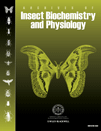SILKWORM 30K PROTEIN INHIBITS ECDYSONE-INDUCED APOPTOSIS BY BLOCKING THE BINDING OF ULTRASPIRACLE TO ECDYSONE RECEPTOR-B1 IN CULTURED Bm5 CELLS
Grant sponsor: Korea University.
Abstract
This study investigates the mechanism through which increased 30K protein inhibits ecdysone-induced apoptosis in the Bm5 silkworm ovarian cell line. Treatment of Bm5 cells with 20-hydroxyecdysone (20E) after transfection with the pIZT/V5-His control vector triggered apoptosis, but 20E treatment did not trigger apoptosis in Bm5 cells transfected with the pIZT/30K/V5-His vector. To confirm its inhibitory effect on apoptosis, 30K protein was first purified from Escherichia coli transformed with a 30K expression vector and used to generate specific antibodies in mice. Anti-30K antiserum was used to confirm synthesis of the 30K protein in pIZT/30K/V5-His-transfected Bm5 cells and to detect 30K protein binding to the ecdysone receptor-B1 (EcR-B1). Anti-30K antiserum was used to immunoprecipitate protein complexes containing 30K from Bm5 cells transfected with pIZT/30K/V5-His vector and treated with 20E. We observed that 30K proteins bound primarily to the EcR-B1 and not to ultraspiracle (USP). Reciprocal immunoprecipitation of EcR-B1-containing complexes from Bm5 cells transfected with control pIZT/V5-His vector and treated with 20E showed that EcR-B1 bound to USP in the absence of 30K but did not bind to USP in pIZT/30K/V5-His-transfected Bm5 cells. These results demonstrate that 30K proteins block USP binding to EcR-B1 through formation of a 30K/EcR-B1 complex, resulting in inhibition of 20E-induced Bm5 cell apoptosis.




